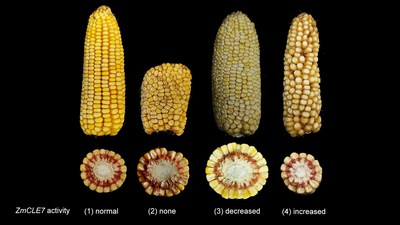Corn — or maize — has changed over thousands of years from weedy plants that make ears with less than a dozen kernels to the cobs packed with hundreds of juicy kernels that we see on farms
COLD SPRING HARBOR, N.Y., Feb. 22, 2021 /PRNewswire/ -- Corn — or maize — has changed over thousands of years from weedy plants that make ears with less than a dozen kernels to the cobs packed with hundreds of juicy kernels that we see on farms today. Powerful DNA-editing techniques such as CRISPR can speed up that process. Cold Spring Harbor Laboratory (CSHL) Professor David Jackson and his postdoctoral fellow Lei Liu collaborated with University of Massachusetts Amherst Associate Professor Madelaine Bartlett to use this highly specific technique to tinker with corn kernel numbers. Jackson's lab is one of the first to apply CRISPR to corn's very complex genome.
DNA is divided into two parts: the gene and the regulatory regions that promote or suppress gene activity. Jackson says:
"A lot of people were using CRISPR in a very simple sense just to disrupt genes completely, to knock out the gene. But we came up with this new idea to CRISPR the promoter regions that turn the gene on. And that is what gives this very interesting result where we can get the variation in traits that we need in agriculture."
Jackson wanted to increase the number of kernels per cob. The corn kernel development pathway includes genes that promote stem cell growth and differentiation into distinct plant organs. Jackson and Liu focused on CLEs, a family of genes that act as a brake to stop stem cell growth. But the corn genome is complex. The CLE family contains almost 50 related genes, with promoter regions that vary from gene to gene. What parts are most important for kernel production? Liu says:
"So we basically randomly targeted the promoter region: we have no idea which part of the promoter is important. So probably the next step, we will focus more on figuring out which part of the promoter is critical. And, then we probably will make our promoter CRISPR more efficient. We can get a better allele which can produce more grain yield or ear size."
Cereal crops like maize are a major source of food for humans and feed for livestock. Jackson and Liu hope their new CRISPR strategy will increase crop yield per acre and make agriculture more sustainable.
About Cold Spring Harbor Laboratory
Founded in 1890, Cold Spring Harbor Laboratory has shaped contemporary biomedical research and education with programs in cancer, neuroscience, plant biology and quantitative biology. Home to eight Nobel Prize winners, the private, not-for-profit Laboratory employs 1,100 people including 600 scientists, students and technicians. For more information, visit www.cshl.edu.
![]() View original content to download multimedia:http://www.prnewswire.com/news-releases/tweaking-corn-kernels-with-crispr-301231548.html
View original content to download multimedia:http://www.prnewswire.com/news-releases/tweaking-corn-kernels-with-crispr-301231548.html
SOURCE Cold Spring Harbor Laboratory





